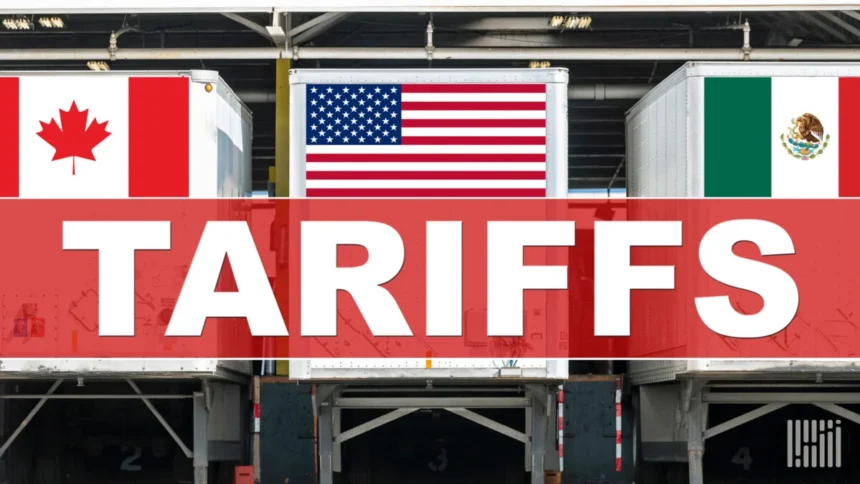The 25% tariffs imposed by President Trump on imports from Canada and Mexico took effect Tuesday, with economists warning that they will likely lead to higher consumer prices—sometimes in unexpected ways. A lower 10% tariff was applied specifically to Canadian energy.
How Tariffs Impact Consumers
Tariffs are a tax on imported goods paid by U.S. companies that bring those products into the country. These additional costs are often passed on to consumers, increasing prices.
Some effects are straightforward—for example, fruits and vegetables from Mexico and oil from Canada will become more expensive. However, tariffs also create ripple effects throughout complex supply chains, making it difficult to predict the full extent of price increases.
Unexpected Price Increases
Economist Travis Tokar from Texas Christian University explains that tariffs affect supply chains in ways that aren’t always obvious. For instance, while a fast-food chicken sandwich might not contain directly imported ingredients, the aluminum foil used in its packaging could be sourced from Canada or Mexico, increasing costs.
Another major concern is fuel prices. According to the Peterson Institute for International Economics, the U.S. imports nearly half of its foreign fuel from Canada. Since most consumer goods are transported by trucks running on refined oil, tariffs on Canadian crude oil could lead to higher transportation costs, making a wide range of products more expensive.
“Costs eventually have to go through the supply chain to the end consumer,” said Mary Lovely, a senior fellow at the Peterson Institute.
Tariffs Expected to Disrupt the Auto Industry
The automobile industry is expected to be one of the hardest-hit sectors by the new tariffs on Canada and Mexico, as North American supply chains are deeply interconnected.
How Tariffs Affect Car Prices
Even if a car is assembled in the U.S., many parts come from Canada or Mexico, meaning higher import costs for automakers. According to Travis Tokar, an expert in supply chain management, vehicles produced in Alabama or Michigan may still be impacted if essential components are sourced from outside the U.S.
A Bank of America Global Research report warns that major car manufacturers like Ford, General Motors, and Stellantis will likely see higher production costs due to their reliance on cross-border supply chains for parts and assembled vehicles.
Higher Car Prices & Insurance Costs
The impact on car prices could be significant. Investment bank Benchmark Co. estimated in February that tariffs on Canada and Mexico could add nearly $6,000 to the price of a new car. Additionally, rising vehicle costs will lead to higher car insurance premiums.
“This will be hugely disruptive for the auto industry,” said Douglas Irwin, an economics professor at Dartmouth College and author of Clashing over Commerce: A History of U.S. Trade Policy.
Retaliation Adds to Consumer Impact
Consumers won’t just feel the effects of U.S. tariffs—they will also be impacted by foreign retaliation, as Mexico, Canada, and China have already committed to countermeasures.
“You don’t put these kinds of tariffs in place without expecting retaliation, and that’s happening right now,” said Field, an economic analyst.
Canadian Prime Minister Justin Trudeau immediately announced a 25% tariff on C$30 billion worth of U.S. imports. An additional C$125 billion in U.S. goods will be taxed in 21 days. In response, Trump vowed to impose even more tariffs on Canada.
Additionally, Ontario will impose a 25% tax on electricity exports to Minnesota, Michigan, and New York, impacting 1.5 million homes, according to Doug Ford, the province’s leader.
China & Mexico Retaliate
China is also hitting back with up to 15% tariffs, specifically targeting U.S. agriculture. For example:
- U.S. corn will face a 15% tariff
- Soybeans will be taxed at 10%
Meanwhile, Mexican President Claudia Sheinbaum will announce her country’s retaliatory measures on Sunday.












